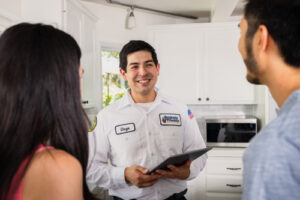
Do You Need Professional Drain Cleaning? Let’s Talk About It
You know that feeling when you’re taking a shower and suddenly realize you’re standing in a puddle? Or when you flush the toilet and it makes that strange gurgling sound before barely doing its job? Yeah, we’ve all been there. These aren’t just minor annoyances—they’re your plumbing’s way of waving a red flag.
I’ve seen what happens when these warning signs get ignored, and trust me, it’s never pretty. Let me walk you through how to know when it’s time to call in the pros, what to expect when they arrive, and how to prevent these issues from coming back to haunt you.
Signs You Need a Professional’s Help
Let’s be honest—most of us try the DIY approach first. A little drain cleaner here, a plunger there. But when should you stop the home remedies and pick up the phone?
Here’s my checklist:
- Multiple Slow Drains If just your bathroom sink is backing up, maybe it’s hair or toothpaste buildup. But when your kitchen sink, shower, and laundry drain are all moving at a snail’s pace? That’s a bigger issue—likely in your main line—and it needs professional attention.
- Those Weird Gurgling Noises Ever flush the toilet and hear your sink making bubble sounds? Or run water in the sink and hear the toilet burbling? That’s air trapped in your pipes trying to escape around a blockage. Your plumbing is literally crying for help.
- Mystery Odors When your drains start smelling like a dumpster on a hot summer day, something’s trapped and decomposing in there. And no amount of air freshener is going to solve the actual problem.
- The Toilet That Keeps Rebelling We all deal with the occasional clogged toilet. But if you’re on a first-name basis with your plunger and using it weekly, something’s seriously wrong deeper in the system.
- Synchronized Clogging When multiple fixtures back up simultaneously—like the toilet overflows when you run the washing machine—you’ve got a main line issue. This is definitely not DIY territory.
- Old House, Big Trees Live in an older home with mature trees in the yard? Tree roots are naturally drawn to water sources, and they’re surprisingly good at finding tiny cracks in your sewer line. If you’ve just moved in or haven’t had your lines checked in years, it’s probably time.
What a Professional Drain Cleaning Involves
When you call a plumber for drain cleaning, here’s what should happen:
- They’ll Start by Listening A good plumber begins by asking questions: How long has this been happening? Which drains are affected? What have you already tried? This helps them diagnose the problem before they even look at your pipes.
- Thorough Inspection They might start with simple tools, but a professional will have specialized equipment like drain cameras that can actually see inside your pipes. This lets them identify exactly what’s happening and where.
- Complete Blockage Removal Depending on what they find, they’ll use the right tools for the job—maybe a powerful auger for a tough clog, or hydro jetting to clear out buildup along the pipe walls. The goal isn’t just to poke a hole through the clog but to remove it entirely.
- Testing the Flow Once the work is done, they should run water through the system to ensure everything flows properly. No more slow drains, no more gurgling.
- Prevention Advice A professional will explain what caused the problem and how to prevent it from happening again. They should leave you with practical tips, not just a bill.
Common Questions About Drain Cleaning
Can’t I just use liquid drain cleaner?
I generally don’t recommend chemical drain cleaners. They might create a small path through a clog, but they rarely solve the underlying problem. Worse, they can damage your pipes over time, especially if you have older plumbing.
How often should I have my drains professionally cleaned?
If you’ve had recurring issues or live in an older home, annual cleaning is a smart preventive measure. Otherwise, watch for the warning signs I mentioned earlier.
What exactly is hydro jetting?
It’s basically a pressure washer for your pipes—high-pressure water that scours away buildup, grease, and even tree roots. It’s incredibly effective and doesn’t use chemicals.
Will they have to dig up my yard
Most drain issues can be resolved through existing access points inside your home. If digging becomes necessary, a good plumber will explain exactly why and what to expect.
Don’t Wait Until Disaster Strikes
Here’s the thing about plumbing problems—they never get better on their own. That slow drain will eventually become a complete blockage. That occasional toilet overflow could turn into a sewage backup in your basement.
When your drains start showing these warning signs, it’s not just about convenience—it’s about protecting your home from water damage and potentially expensive repairs down the road.
The best plumbers don’t just fix the immediate problem; they help you understand what’s happening with your plumbing system and how to keep it running smoothly. Because nobody wants to be ankle-deep in shower water on a Monday morning when you’re already late for work.

